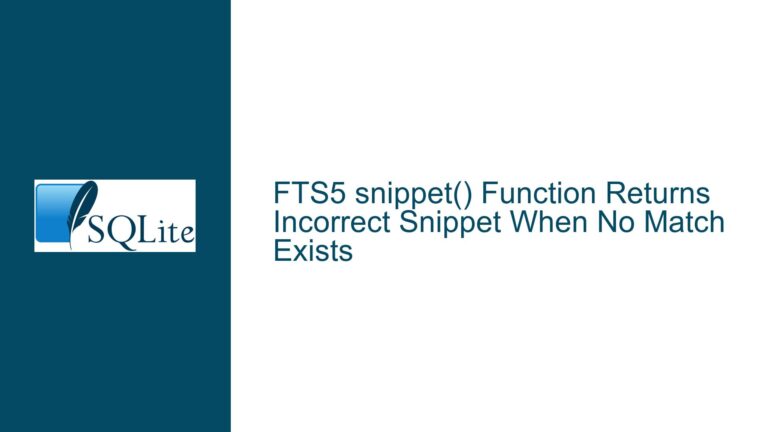Handling User Input Safely in SQLite FTS5 Search Queries
Issue Overview: FTS5 Query Syntax Conflicts with Raw User Input
When implementing a user-facing search API using SQLite’s FTS5 extension, developers encounter a critical challenge: FTS5’s native query syntax interprets special characters (e.g., ", OR, NOT, AND, parentheses) as operational commands rather than literal search terms. This creates conflicts when raw user input containing these characters is passed directly to FTS5’s MATCH operator through parameterized queries.
For example:
- A user searching for
C++ "framework"may inadvertently trigger phrase matching or syntax errors - Input like
O'Reillyor12" monitorintroduces unescaped quotes that break query parsing - Terms such as
admin OR 1=1could enable unintended boolean logic exploitation
The core problem lies in the impedance mismatch between free-form text input from users and FTS5’s expectation of structured search operators. While basic workarounds like splitting input into quoted tokens ("C++" "framework") provide partial solutions, they fail to address edge cases involving pre-existing quotes, punctuation in terms, and legitimate use of FTS5 operators that should remain accessible to power users.
Possible Causes: Syntax Collisions and Insufficient Input Sanitization
Three primary factors contribute to this issue:
FTS5 Operator Overlap with Natural Language Patterns
- Common punctuation marks (
.,-,') used in product names/acronyms - Boolean terms (
AND,OR,NOT) appearing in normal prose - Quoted phrases matching FTS5’s exact phrase operator syntax
- Common punctuation marks (
Inadequate Input Normalization Layers
- Direct concatenation of user input into FTS5 queries without escaping
- Over-simplified tokenization that doesn’t account for quoted substrings
- Lack of syntax whitelisting/blacklisting for controlled operator exposure
SQLite API Limitations in Parameter Binding
- Parameterized queries (
?placeholders) prevent SQL injection but don’t escape FTS5 syntax - No built-in mechanism to toggle between "literal mode" and "operator mode"
- Version disparities in FTS5 feature support (e.g.,
quote()function availability)
- Parameterized queries (
These factors create a scenario where even properly parameterized queries remain vulnerable to syntax-induced search malfunctions. The absence of an FTS5-specific escaping function in older SQLite versions exacerbates the problem, forcing developers to implement custom sanitization routines.
Troubleshooting Steps, Solutions & Fixes: Escaping Strategies and Query Architecture
Step 1: Validate SQLite Environment Capabilities
Confirm SQLite version ≥3.20.0 (2017-08-01) for FTS5’s quote() function support:
import sqlite3
conn = sqlite3.connect(':memory:')
cursor = conn.cursor()
cursor.execute('SELECT sqlite_version()')
version = cursor.fetchone()[0]
print(f"SQLite version: {version}") # Require ≥3.20.0
If using an older version, prioritize upgrading the SQLite library or consider alternative approaches outlined below.
Step 2: Utilize FTS5’s Built-in Escaping Mechanism
For compatible environments, use the quote() function to safely escape user input:
def escape_fts_query(user_input: str, cursor: sqlite3.Cursor) -> str:
cursor.execute("SELECT quote(?)", (user_input,))
escaped, = cursor.fetchone()
return f"({escaped})" # Wrap in parentheses for single-term treatment
Implementation example:
user_search = 'C++ "framework" O'Reilly'
cursor.execute("""
SELECT * FROM fts_table
WHERE content MATCH ?
""", (escape_fts_query(user_search, cursor),))
This approach:
- Neutralizes special characters via SQLite’s native escaping
- Handles nested quotes and punctuation uniformly
- Preserves exact user input as a single search term
Step 3: Implement Custom Python Escaping for Legacy Systems
When quote() is unavailable, create a hybrid sanitizer:
def sanitize_fts_query(user_input: str) -> str:
# Step 3a: Escape internal double-quotes
escaped = user_input.replace('"', '""')
# Step 3b: Wrap in quotes while preserving intentional operators
if ' ' in escaped and not (
escaped.startswith('"') and escaped.endswith('"')
):
escaped = f'"{escaped}"'
# Step 3c: Neutralize SQLite FTS5 reserved characters
reserved_chars = r'^[](){}*+-?:!&|~'
for char in reserved_chars:
escaped = escaped.replace(char, f'\\{char}')
return escaped
This function:
- Doubles internal quotes to escape them
- Wraps space-containing terms in quotes unless already quoted
- Prefixes reserved characters with backslashes
- Preserves case sensitivity and wildcard usage
Step 4: Design Query Parsing Pipelines for Controlled Operator Support
For APIs requiring partial operator exposure (e.g., allowing AND but not NOT), implement a parser with operator whitelisting:
from pyparsing import (
Word, alphas, QuotedString, Group, Suppress, ParseException
)
# Define grammar
AND, OR, NOT = map(Suppress, ['AND', 'OR', 'NOT'])
term = QuotedString('"', escChar='\\', unquoteResults=False) | Word(alphas + '-_')
expression = term + (AND + term | OR + term | NOT + term)[...]
def validate_fts_syntax(user_input: str):
try:
expression.parseString(user_input, parseAll=True)
return True
except ParseException:
return False
Integrate with sanitization:
def preprocess_search(input_str: str, cursor: sqlite3.Cursor) -> str:
if not validate_fts_syntax(input_str):
return escape_fts_query(input_str, cursor) # Fallback to full escaping
return input_str # Trust validated input
Step 5: Adopt Tokenization Strategies Aligned with FTS5 Tokenizer Rules
Match the FTS5 table’s tokenizer (default: porter) to ensure query-time and index-time compatibility:
-- Create table with same tokenizer used at index time
CREATE VIRTUAL TABLE fts_table USING fts5(
content,
tokenize='porter unicode61 separators "-_."'
);
Mirror tokenization in preprocessing:
import re
def tokenize_fts_input(user_input: str) -> list:
# Align with unicode61 tokenizer rules
tokens = re.findall(
r'\w[\w\-\.]*\w|\w|"[^"]+"', # Matches words, single letters, phrases
user_input,
re.UNICODE
)
return [t if t.startswith('"') else t.lower() for t in tokens]
Reconstruct with proper escaping:
def build_fts_query(tokens: list) -> str:
return ' '.join(
f'"{t[1:-1].replace('"', '""')}"'
if t.startswith('"')
else t.replace('"', '""')
for t in tokens
)
Step 6: Deploy Hybrid Query Templates for Advanced Use Cases
Combine escaped literals with intentional operators using template substitution:
TEMPLATES = {
'exact': '"{phrase}"',
'prefix': '{term}*',
'boolean': '({left}) {op} ({right})'
}
def construct_advanced_query(
terms: list[str],
template: str = 'exact'
) -> str:
escaped_terms = [
TEMPLATES[template].format(
phrase=t.replace('"', '""'),
term=t.replace('*', '\\*')
)
for t in terms
]
return ' AND '.join(escaped_terms)
Step 7: Benchmark and Optimize Escaping Performance
Profile escaping impact on query latency:
import timeit
setup = '''
import sqlite3
conn = sqlite3.connect(':memory:')
cursor = conn.cursor()
user_input = 'Search term with "quotes" AND operators'
'''
native_escape = timeit.timeit(
'cursor.execute("SELECT quote(?)", (user_input,))',
setup=setup,
number=1000
)
custom_escape = timeit.timeit(
'sanitize_fts_query(user_input)',
setup=setup + 'from __main__ import sanitize_fts_query',
number=1000
)
print(f"Native: {native_escape:.4f}s | Custom: {custom_escape:.4f}s")
Optimize based on results:
- Batch escape operations for bulk queries
- Cache common search patterns
- Implement compiled regex for sanitization
Step 8: Develop Comprehensive Test Suites
Validate all edge cases with unit tests:
import unittest
class TestFtsEscaping(unittest.TestCase):
def test_quoted_phrase(self):
self.assertEqual(
sanitize_fts_query('exact "phrase match"'),
'"exact ""phrase match"""'
)
def test_reserved_chars(self):
self.assertEqual(
sanitize_fts_query('file*.txt'),
r'file\*\.txt'
)
def test_mixed_operators(self):
self.assertTrue(
validate_fts_syntax('"required term" AND optional')
)
self.assertFalse(
validate_fts_syntax('invalid) OR (injection')
)
Step 9: Implement Monitoring and Fallback Mechanisms
Log failed queries for continuous improvement:
import logging
logger = logging.getLogger('fts_query')
try:
cursor.execute(query, params)
except sqlite3.OperationalError as e:
logger.error(f"FTS5 query failed: {e}\nOriginal input: {user_input}")
raise APIError("Invalid search syntax") from e
Step 10: Document User-Facing Search Syntax Options
Provide clear guidelines for allowed syntax:
Supported search patterns:
- "exact phrases"
- wildcards: term*
- boolean operators: AND, OR, NOT
Escape special characters with \ (e.g., C\+\+ or 12\" monitor)
This multi-layered approach ensures robust handling of FTS5 search queries while balancing security, performance, and usability. Developers must choose the appropriate combination of escaping mechanisms, syntax validation, and query templating based on their specific requirements for operator support, input complexity, and performance constraints.






